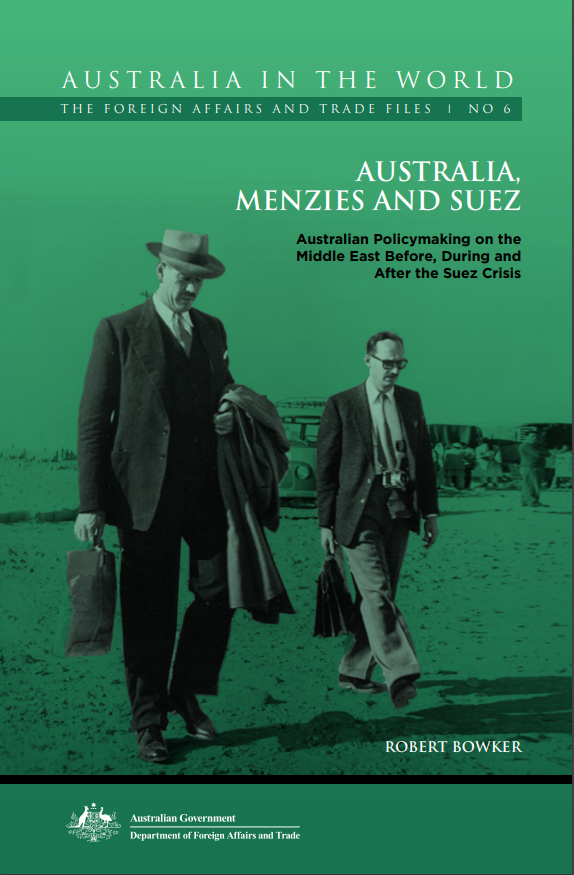Book Review: Australia, Menzies and Suez: Australian Policymaking on the Middle East Before, During and After the Suez Crisis

Robert Bowker uses long-secret cabinet notebooks to throw light on Australian political decision-making in the Suez Crisis of 1956, when Prime Minister Menzies took out insurance with a great power partner by giving conspicuous but token support for British action against Egypt, at some cost to Australia’s international reputation.
A forthcoming volume in the official Documents on Australian Foreign Policy series which Bowker’s study precedes will include transcriptions of the cabinet notebooks of the time. Only in recent decades has the National Archives begun to release cabinet notes, and previous studies of Australia’s role in the Suez Crisis were not informed by them.
The notes contain unrehearsed arguments of ministers at cabinet meetings, jotted down by a Prime Minister’s Department official with no thought that they could ever be published. Although an incomplete record, cabinet notes usually contain less backside-covering and virtue-signalling than documents prepared for the official record. They also indicate the state of knowledge of the policymakers, who took what side, and why.
A few quotes from the notebooks show the flavour of the cabinet discussion. On motivation, Menzies’ deputy, and leader of the Country Party, John McEwen said at one point: “if UK is in, we’re in, that’s my view”, expressing the pervasive popular and political position in the 1950s on Australia’s national identity as part of a wider British imagined community. This identity meant that Australia’s support for Britain was unexceptional and domestically uncontroversial.
Internationally, Australia’s prominence in the Suez Canal case came from the vigour with which Menzies argued that nationalisation of the canal threatened a rules-based international order and the rights of canal users. But when the question of the international order was discussed in cabinet, Menzies said: “… let us put all UN procedure on one side. It is true the Jews invaded Egypt. Why? They see themselves in a nutcracker situation … this is a good chance to show the Egyptians are vulnerable. … aren’t UK and France entitled to strike a blow or are they to observe the debating rules?”
When Britain and France proved unable to seize and hold by force the rights they claimed, the reaction of the United States, the senior partner in the Western alliance system, became decisive. McEwan then said: “critical thing is that UK has US with them … US doesn’t want UK to become another Portugal … got to create impression of strength because strength (appearance of) is most important.” The Cabinet then hoped it might be possible, as Territories Minister Paul Hasluck, put it, to “tone up [US Secretary of State] Dulles.”
The risks were emphasised by External Affairs Minister R.G. Casey, a consistent voice for caution in the cabinet, who summed up at one point: “You’d beat Egypt no doubt but you’d stir up the ME. Attacks on Israel would be rife. Israel would be on our side, therefore Middle East mainly against us.”
Casey expressed this more formally in one of the documents:
If and when the first round is fired the merits of the Suez Canal dispute will be forgotten, and the fact that a Great Power has used force on a small Afro-Asian nation to deal with a political problem will dominate the minds of the majority of countries. World opinion would be overwhelmingly against the United Kingdom and inferentially against Australia.
Bowker found no evidence of Menzies’ complicity in an undeclared British grand strategy to end Egypt’s quest for regional hegemony by toppling the regime of President Nasser. He does show, however, that Menzies knew important things about exchanges between Britain and the US which he did not pass on to his colleagues. Bowker also found a plaintive complaint from Casey to the British High Commissioner that ministers “had been getting nothing from Mr Menzies.”
In the Suez Crisis, Australia supported a failed British intervention at some cost to its international reputation – but the intervention cost Britain much more. The Menzies Government could have helped Britain more by voicing arguments like Casey’s in London than it did by its ineffective public support of a policy likely to fail. But then, as now, the mechanisms for a minor partner to have a voice in such a case were limited.
Formerly an “Arabist” in the Australian foreign service, Bowker has since been affiliated with the Centre for Arab and Islamic Studies at the Australian National University. Bowker regrets that the rising strength of Arab nationalism in the post-war era did not generate in Australian policy circles the detailed, forward-looking analysis of potential consequences for Australian interests he thinks was warranted.
But perhaps Arab nationalism was more a rationalisation than a reason for Egypt’s actions, just as the rules-based order carried less weight than alliance issues for Australia. Think-pieces from public servants or academics might have contributed little to the government’s deliberations.
The notebooks show that the main relevant arguments were before cabinet. Casey’s decades of experience at senior levels of government and diplomacy in the UK, the US, the Middle East, and in pre-independence India gave him knowledge and a breadth of contacts relevant to the issue that far exceeded anything that support from the Australian foreign policy officials (or academics) of the time could have contributed.
The documents show that questions about the wisdom of British policy were raised inside the Department of External Affairs but without any evident impact.
This was a delicate process. When Peter Heydon, one of the heaviest hitters in the Department, asked whether war might “defeat its own objectives,” he attributed the question to a (possibly imaginary) senior Indian official, thus bringing in the potential effects on Australia’s standing in the Third World, while avoiding personal responsibility for the thought. Heydon’s caution, along with the silence of most of his colleagues, says something about the difficulties officials faced in raising unpopular and politically contentious questions.
Bowker’s use of the cabinet notes, and what he has turned up through wide research beyond the documents, adds depth and colour to what was inferred by earlier historians on the thinking behind Australia’s involvement in an interesting case of the politics of an unequal alliance.
Peter Hamburger filled quite a few cabinet notebooks in a career culminating as head of the Cabinet Division in the Department of the Prime Minister and Cabinet for six years in the early 2000s.
This is a review of Robert Bowker’s Australia, Menzies and Suez: Australian Policymaking on the Middle East Before, During and After the Suez Crisis (Department of Foreign Affairs and Trade), ISBN 9781743225271. It is for sale for $25.00 at the National Library of Australia online bookshop: bookshop.nla.gov.au
This article is published under a Creative Commons Licence and may be republished with attribution.





